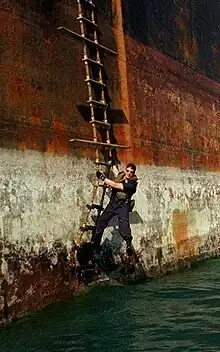Pilot ladder
A pilot ladder is a highly specialized form of rope ladder, typically used on board cargo vessels [1] for the purposes of embarking and disembarking pilots. The design and construction of the ladders is tightly specified [2] by international regulation under the SOLAS regime.

Construction
The ladders are made by threading and fixing a series of hardwood, machined steps, each not more than 400 mm × 115 mm × 25 mm (15.75 in × 4.53 in × 0.98 in), onto two pairs of minimum 18 mm (0.71 in) diameter manila ropes, and binding each step to the ropes at 310 mm (12 in) (+- 5 mm, 0.20 in) intervals. At a maximum interval of eight steps, the standard step is replaced by a spreader, which is an elongated version of the standard machined step, with a minimum length of 1.8 m (5 ft 11 in). The spreader's function is to prevent the ladder from twisting in the prevailing weather conditions when in use.
The lowest four steps of the ladder are normally made from a synthetic or composite resin, which is more resistant than hardwood, to the interaction between the host vessel and the pilot boat coming alongside.
Because the decks of most commercial ships are far above the waterline, pilots and others who need to come aboard at sea can usually only do so if a pilot ladder is put out. When not being used, the ladder is stowed away (usually rolled up) rather than left hanging.
See also
References
- International Chamber of Shipping and International Maritime Pilots' Association (2012). "Shipping Industry Guidance on Pilot Transfer Arrangements" (PDF). ics-shipping.org. Marisec Publications. Archived (PDF) from the original on 2020-12-28. Retrieved 2020-12-28.
- "The Merchant Shipping (Pilot Ladders and Hoists) Regulations 1987". Statutory Instrument No. 1961 of 1981. U. Archived from the original on 2020-12-28.